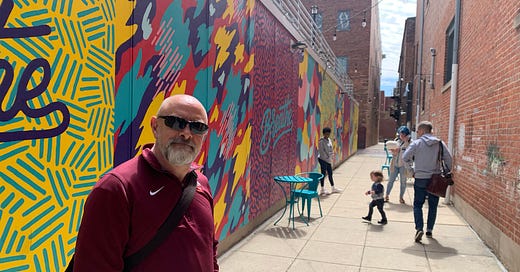064 - On why finding words always takes work.
We're walking with people in grief, not fixing their grief.
Welcome back (or welcome).
“Finding words in hard times” isn’t just a title. It describes the challenging work that you and I do. Because in hard moments, we struggle to find words.
We read our email or walk into rooms or get texts in the middle of the night. We see messages on Facebook with news from friends or from our communities.
There is something about this room, this situation, this moment, that makes us stop and catch our breath.
The tininess of a lifeless baby at fifteen gestational weeks, swaddled and in his mother’s hand.
The quiet resignation of the son who arrived from out of state two hours before his dad died.
The eyes of the young husband, knowing the next hours will not end well.
Or there is something about this situation, this month, this season, that makes us worry about our faithfulness as a human who cares about other humans.
The awkwardness of the first face-to-face meeting after a death.
The gap between the email and your response.
The feeling that we ought to respond somehow.
What do we say? Where do we start?
There are, of course, people with all the answers and none of the self-awareness. They walk in, drop a weighted blanket of expertise on the fragile heart and leave. The crushing of right answers and expectations leaves our loved ones, our friends, the humans we know overwhelmed in every way.
You are not one of those people. You wouldn’t be reading these words if you didn’t care about being helpful.
These moments are always hard. There are no tips and tricks (I hate that phrase) for making grief and trauma all better.
We can start by recognizing the privilege of being present.
My friend and chaplain colleague Dianna writes that sometimes we need to take what we know and who we are and bring it into this moment without having all the answers. Recently, her son-in-law died in the hospital where we both serve.
I usually don’t cry. I often need to be the strong one. My emotions rarely get the best of me. But for the two hours we spent in his room, the earthquake in my heart and mind forced a storm of tears. I was not stoic. I was no longer a mom, wife, chaplain, pastor. I was just me. In some strange way, there was relief in that moment of intense emotional pain. I felt present. It was real. It was intense. It hurt. I hurt and joined in with the grief of those around me as we watched our loved one die.
As pediatric ICU nurse Hui-wen Sato writes, it is a privilege to be allowed into moments of crisis and uncertainty.
I held her closer, and for just a moment, I felt her muscles relax, and unfreeze.
“Thank you for letting me talk to you.”
I was reluctant to let her go. Who will help them become unfrozen?
I felt an aching gratitude for this incredible privilege of being a nurse. Stories beg to be told. It is a privilege to be allowed into these stories.
And then, as we sort through the deafening silence and the infinite collection of unsatisfactory options. we can think and act deliberately.
Before speaking, take a moment to read the room, to look into eyes, to look at the tension of bodies and relationships, to take in the tears or the laughter.
Before you read the room, take a second to read your own heart and mind.
I weep with but I don’t sob with.
I’m softened by my own stories and strengthened by healing, but I won’t burden them with my answers.
I speak a word or few, but I avoid preaching.
I want to leave space (but too often I leave the space.)
I’m accompanying on a journey that unfolds, not finding answers that won’t fix anyway.
There is work in caring and caring about and caring for. It can and will and maybe should be exhausting.
Thank you for doing that work.
+++
Thanks for coming here each week. I’m grateful for comments and support and questions and shares.
Jon






And I'm grateful for the official, and unofficial, care you provide. Thank you.
A couple thoughts shared above are especially meaningful—before you read the room, read your own heart… and. It’s a privilege to be allowed into moments of crisis and uncertainty.
I am no longer formally walking with families and patients in their final days but I still feel drawn to be present to them . I am grateful